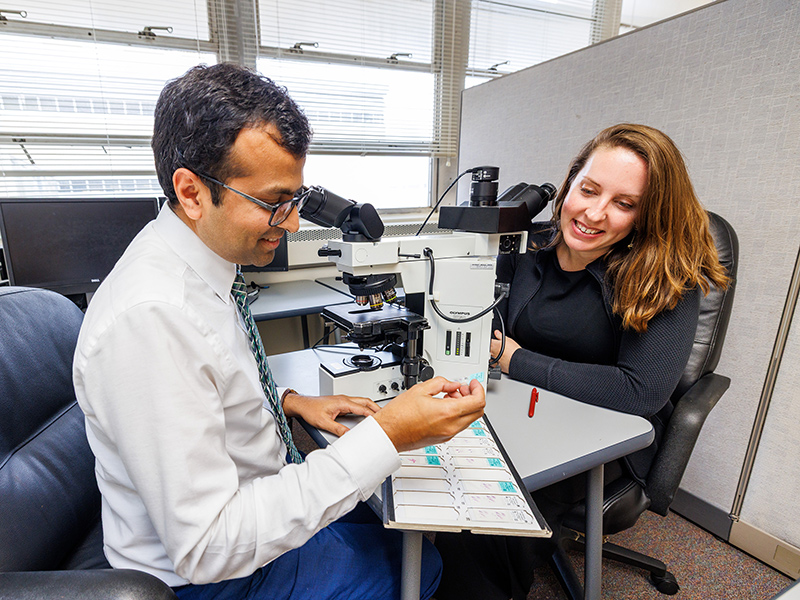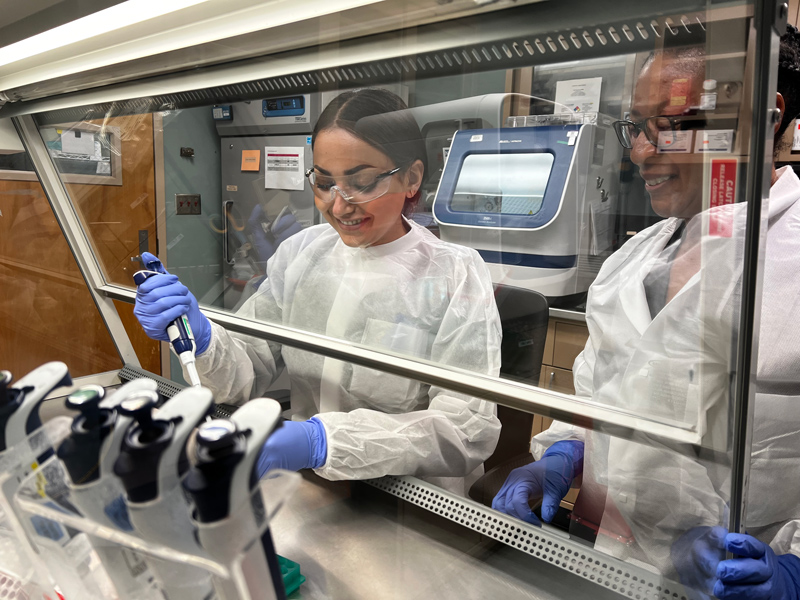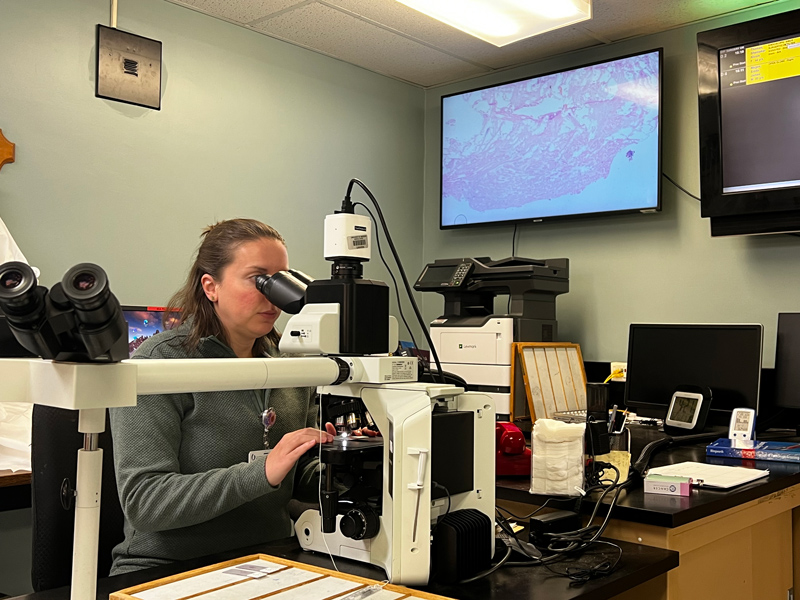AP-CP Residency Program
- About the Department
- Educational Programs
- Service Divisions
- Research
- UMMC Lab Services
AP-CP Residency Program

Life as a UMMC Pathology Resident
At the University of Mississippi Medical Center (UMMC), our pathology residency program offers a comprehensive and engaging training experience in a supportive, collaborative environment. Residents benefit from a structured curriculum, high-volume cases, hands-on learning, and access to excellent resources—all within an affordable, low-traffic city.
Resident Schedule and Education
Our program features a two-year strong didactic schedule that lays a solid foundation for lifelong learning. PGY1 residents do not take call, allowing them to focus on building diagnostic and technical skills early in training. The call schedule begins in the second year, with initial supervision by senior residents before transitioning to independent duties.
A typical day in Surgical Pathology looks like this:
 6:00–9:00 AM: Case preview
6:00–9:00 AM: Case preview- 9:00–11:45 AM: Sign-out with attendings
- 11:45 AM–12:00 PM: Lunch break (with access to Chick-fil-A, Subway, and the hospital cafeteria located just steps from the department)
- 12:00–1:00 PM: Noon conference (residents are welcome to eat during the session)
- 1:00–5:00 PM: Grossing
| AP Rotation | Required Months |
| Orientation | 1 |
| Surgical Pathology | 12 |
| Autopsy | 4 |
| Frozens | 3 |
| Cytopathology | 4 |
| Dermatopathology | 1 |
| Total Anatomic Pathology | 25 |
| CP Rotation | Required Months |
| Medical Kidney/Immunology | 2 |
| Hematopathology | 4 |
| Flow | 1 |
| Blood Bank | 4 |
| Chemistry | 2 |
| Microbiology | 2 |
| Molecular Pathology | 1 |
| Cytogenetics | 1 |
| Lab Management | 1 |
| Total Clinical Pathology | 18 |
| Electives | 5 |
| Total AP/CP | 48 |
Case Volume and Hands-On Experience
The pathology department processes a wide range of specimens, providing residents with broad exposure and experience:
| 2022 | 2023 | 2024 | |
| Autopsy | 48 | 66 | 71 |
| Dermatopathology | 4963 | 5689 | 5963 |
| Kidney Biopsy | 250 | 326 | 317 |
| Pap Smear | 10589 | 12156 | 11225 |
| Muscle Biopsy | 13 | 17 | 13 |
| Non-Gyn Cytology | 1989 | 2597 | 3122 |
| Surgical Pathology | 17693 | 21176 | 21901 |
With no pathology fellows, every case belongs to the residents—meaning more direct learning opportunities, case ownership, and potential for case reports and presentations.
During grossing, residents focus on educational complex specimens. In the most recent academic year, of the specimens grossed last year, residents handled 23%, pathology technicians handled 51%, and PAs handled 26%. On average, each resident grosses about 4.35 specimens per day during surgical pathology rotations, meeting ACGME requirements while allowing time for preview and sign-out. Frozen sections, averaging 70–80 per week, are handled in tandem with routine grossing as part of the same rotation.
Faculty Involvement and Feedback
 The learning environment at UMMC is collaborative, supportive, and academic. Residents meet with attendings daily at the microscope, and faculty are highly hands-on in teaching. The department has five 5-headed multiheaded microscopes, and a 14-headed scope is available for dermatology unknown sessions and larger group teaching.
The learning environment at UMMC is collaborative, supportive, and academic. Residents meet with attendings daily at the microscope, and faculty are highly hands-on in teaching. The department has five 5-headed multiheaded microscopes, and a 14-headed scope is available for dermatology unknown sessions and larger group teaching.
The program provides a comprehensive evaluation and feedback system, including:
- Daily feedback from faculty and staff
- Monthly formal assessments
- Semi-annual evaluations from faculty and peers, all accessible via MedHub
- Monthly anonymous rotation feedback and annual evaluations of both the program and faculty
Faculty receive evaluation summaries via MedHub to support self-reflection and teaching improvement. Residents are assigned presentations throughout the academic year (PGY1–3), including AP, CP, Autopsy, Frozen section, and Journal Club conferences. Faculty are expected to review presentations ahead of time, provide constructive feedback, and highlight key educational points.
Residents also participate in College of American Pathologists (CAP) sessions and are encouraged to join Quality Improvement (QI) projects, which are voluntary. Journal Clubs and teaching slide sessions occur frequently, with the Chief Resident helping organize and distribute these assignments.
Resources and Benefits
Residents have access to multiple educational tools and subscriptions, including:
- WHO Classification of Tumours Online
- ExpertPath
- PathPrimer
- ASCP Question Bank
- OSLER AP and CP review
- PathDojo question bank
Each resident receives a $2,000 book fund to support their learning and exam preparation. Additionally, residents are allowed:
- 6 interview days for jobs or fellowships (with formal invitation and travel time counted)
- 1 board review course (up to 5 days during training)


